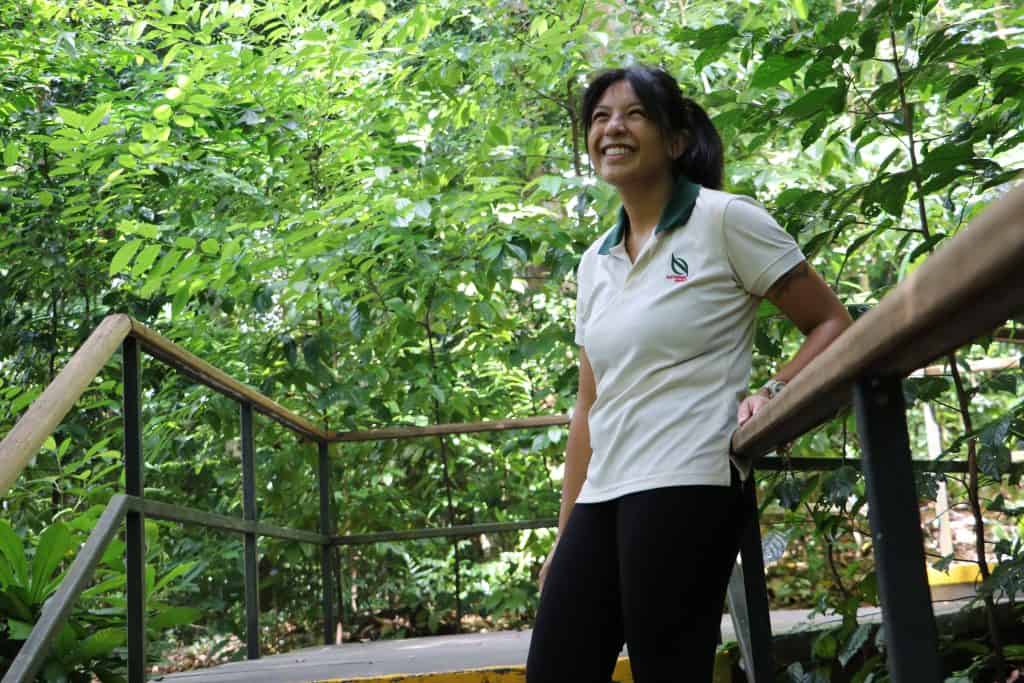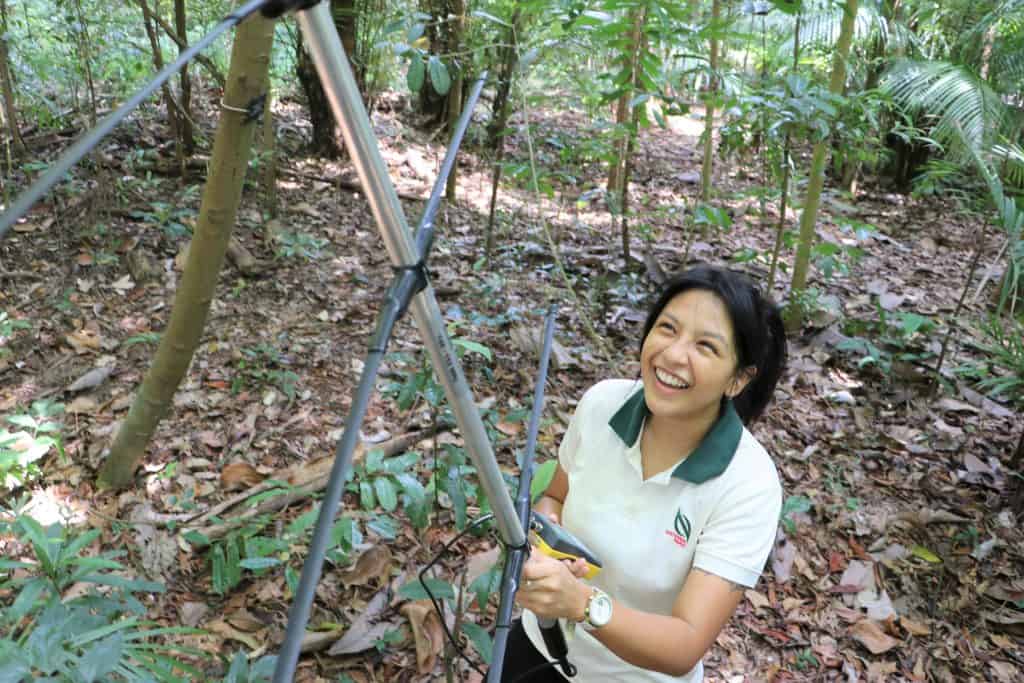Dive into the captivating journey of Rekha Mohan, a National Parks Board (NParks) Scholar and passionate voice for diversity. From university adventures to NParks internships, and awe-inspiring moments like witnessing the Northern Lights and catching her first glimpse of the Antarctica continent from a ship, Rekha shares about her passion, expeditions, and dedicated conservation efforts.
As a senior manager at the Terrestrial branch of NParks’ National Biodiversity Centre today, Rekha contributes to policymaking and on-the-ground conservation work in Singapore. Read on to discover her advice for aspiring scholars on navigating scholarship and career decisions.
“I Knew I’d Never Get Bored Studying Them.”
I’ve been fascinated by animals for as long as I can remember. I grew up watching all sorts of nature shows, from Nigel Marven to Crocodile Hunter and, of course, David Attenborough documentaries, and I remember being overwhelmed by the vast diversity of animals on our planet. I didn’t just love animals; I was curious about them—the interaction between predator and prey, how some can adapt to such extreme environments, and why they exhibit the behaviours they do. Over the years, I gained interest in many different subjects, from literature to psychology and philosophy, but my curiosity for animals never wavered. Perhaps it was the idea that there is so much more to the world than just our lives and the realisation that we are merely part of the Earth that appealed to me. Often, especially in an urban environment like Singapore, we are so absorbed in our own routine lives that we forget we share this Earth with so many other living things. Learning about animals makes me appreciate the wonder and complexity of life, and I knew I’d never get bored studying them. That’s how I ended up doing zoology in university.
Goals Aligned
I first heard about NParks in a small, unassuming article I came across in the newspaper in 2013. It described the situation of some of the wildlife in Singapore, and along with this, NParks was mentioned. Singapore’s biodiversity hardly made the news back then, and I was surprised to learn that there was a statutory board overseeing the conservation of our flora and fauna. While the article did not elaborate on NParks’ role, the association between those two had embedded in my mind. A year later, during the scholarship fair at my school, I learnt more about NParks at their booth. I learnt about their role in greening Singapore, how they are responsible for some of the things I love most about Singapore—nature reserves, parks, and park connectors—as well as their increasing efforts in conservation. NParks’ goals appeared to align with mine, and being a statutory board, it is in a position to implement plans that can shape the future of Singapore for both the fauna and flora, as well as the people who inhabit the country. I felt I could contribute to the organisation by studying what I love, so I applied for the scholarship.
Opportunities Abound
I am grateful to have had the opportunity to study zoology at the University of St Andrews in Scotland under the NParks Undergraduate Scholarship. One of the things I loved most about my university education was the learning environment. I was taught and guided by lecturers who were experts in their fields and generous in sharing their knowledge. I was surrounded by people who not only were enthusiastic and genuinely enjoyed what they were studying but also were trying to make a difference in their daily lives, such as by reducing meat consumption and recycling. And they inspired me to do the same.
NParks has also given me the opportunity to participate in two research expeditions at the end of my first year—in Romania and South Africa. The Romania expedition focused on the effects of agricultural practices on the surrounding biodiversity. The one in South Africa investigated the effect of elephant overpopulation in a game reserve and the extent of elephant damage on the vegetation. As a research assistant, I learnt an array of surveying skills that remains useful in my work today. I also gained a deeper understanding of wildlife management issues such as culling, hunting, and anthropogenic involvement in habitats—issues I initially thought were clear-cut but later realised were more complicated than the mere ethics of the actions alone. I also was offered the chance during my studies to go on an exchange trip to James Cook University in the North of Queensland. My time in Australia was incredible because we constantly were surrounded by wildlife.
There were wallabies, possums, pythons, and all sorts of parrots and other birds outside our dorm. In contrast to the more academic and theoretical education I received at St Andrews, my term at James Cook was more conservation-centric and focused on the practical use of scientific knowledge. This has equipped me with the skills to apply my university knowledge to working at NParks.
Finally, NParks allowed me to do a couple of internships with them before and midway through my studies. I was attached to the Conservation team managing Bukit Timah Nature Reserve for my first internship. I loved it there because I was exposed to a side of Singapore I had not experienced before. It was the best introduction I could have to some of the conservation work done by NParks, and I learnt a lot about the wildlife in Singapore. In my second year, I interned with the Streetscape division that oversees our roadside greenery. This was an area I did not know much about initially but understood was an essential part of NParks’ work in transforming Singapore into our City in Nature. I gained a deeper understanding of some of the main roles of NParks, and it made me realise that there was so much potential for NParks to shape the landscape
and biodiversity in Singapore.
Awe-Inspiring Experiences
Some of my most memorable times involve just being at St Andrews. While it is just a small town in Fife, Scotland, there are beaches, a nearby estuary where you can watch shorebirds, and a forest an hour’s cycle away. It is also one of the towns along the Fife Coastal Path, a long-distance footpath stretching the entire length of the Fife coast, connecting some of the most beautiful villages. I would spend my days walking/cycling through different towns along the beach after class and birdwatching over the weekends. Being located so far north meant that if you were lucky, you might be able to see the Northern Lights at St Andrews. I remember the one occasion I witnessed it. It was a winter night when we heard news that the Northern Lights might be visible. My friends and I, along with many other students, rushed down to the beach. Lying on the cold sand, with the freezing winter wind blowing on our faces, we waited. It must have been a couple of hours before we saw anything. But eventually, huddled up in our blankets, we watched the Northern Lights in the sky. Field trips were also some of my most memorable experiences during my studies. One of my classes had the opportunity to conduct a two-week field study in Argentina and Antarctica. In Ushuaia, Argentina, we went hiking in the Tierra del Fuego National Park. The views were absurdly stunning, and I remember thinking how I could easily spend months trekking through Patagonia. And finally, there isn’t anything else I can compare to being on a ship and getting the first magical glimpse of the icy continent of Antarctica.
Diverse Roles in Wildlife & Conversation
I started in NParks as a Conservation Manager at the Central Catchment Nature Reserve—a role aptly described by a colleague as the custodian of the nature reserve. While ensuring that the reserve is safe for public use is of utmost importance, a Conservation Manager must also be responsible for the flora and fauna of the area. This involves forest restoration works, native seed propagation, and enforcement to stop the poaching of wildlife. Through my early months working there, I grew to appreciate the challenges involved in managing a nature reserve. I was then posted to the newly-formed Wildlife Management division where I was given the unique opportunity to be involved in both the operational and research aspects of wildlife management. As our work impacts the national direction of wildlife management and its consequences on Singapore, it was important that our efforts were evidence-based. For instance, in formulating species management plans, we would first gather data to assess the status of a particular target species before working closely with communities to further understand the nuances involved in managing the species in question. It was in these early years in this division that I felt I was able to make use of the knowledge I had gained in university, such as understanding how to devise a simple ecological study, the use of models to estimate population numbers and project population growth of animals, and developing humane trapping techniques, which we then imparted to wildlife management companies through training. I have been transferred to the Terrestrial branch of the National Biodiversity Centre recently. Our team oversees the impact of developments on biodiversity. This involves screening development plans to assess if an environmental study is required, reviewing Environmental Impact Assessment (EIA) Reports, and working with the developers and EIA consultants to formulate and refine Environmental Management and Mitigation Plans (EMMPs). We also regularly hold nature group engagement sessions to better understand the concerns of various stakeholders on development projects. I have learnt a lot from these engagement sessions, and it is encouraging that local biodiversity expert opinions are genuinely taken into account by developers so that the appropriate mitigation measures can be put in place. Last but not least, I am involved in developing and implementing the Species Recovery Programme for the Inger’s Dwarf Toadlet, a small toad restricted to a specific area in Singapore. Through regular night surveys in the forest, we aim to understand its distribution, estimate its current population size, and uncover more about its ecology, so that we can better formulate plans to boost its population.. I studied zoology with the hope of getting into conservation, and it is really nice that I can do that now, both in terms of policy and on-the-ground conservation work.

A Scholar’s Advice: Navigating Scholarship & Career Decisions
As an eighteen/nineteen-year-old, taking on a scholarship is a big decision. When choosing a scholarship, remember that you are also choosing a career. It is important that you believe in the goals of the organisation. Always choose a course of study that you are passionate about. Scholarship providers often have preferred subject choices for university, but don’t be discouraged if your subject of choice is not listed. If you are confident that you can contribute to the organisation’s goals through your choice of study, don’t be afraid to let them know. Your years in university will shape you, so it is important that you enjoy what you study.
REKHA MOHAN
NParks Overseas Undergraduate Scholarship
Bachelor of Science (Zoology) with Honours (2nd Upper), University of St Andrews, United Kingdom
Now: Senior Manager, Biodiversity (Terrestrial), NParks
From: Anglo-Chinese School (Independent)

